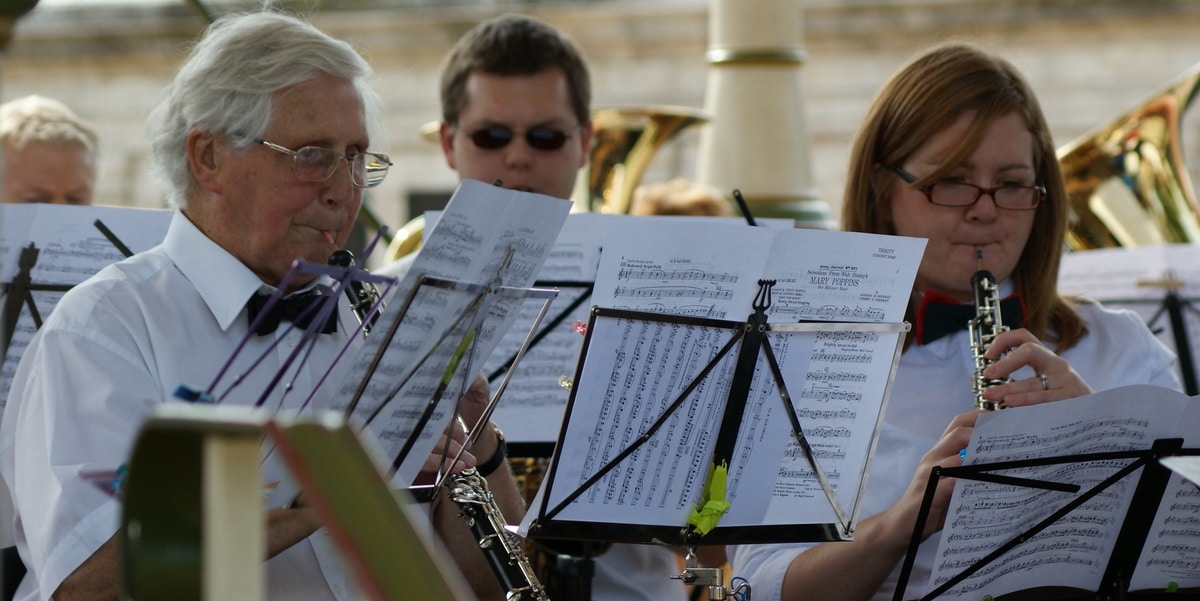Etudes are some of the most important works written for musical instruments. They are the vegetables in the diet - the under-appreciated, most nutritious part of a practice regimen.
Oboe etudes are a vital part of daily practice to all levels of players. You play them as beginners to learn new skills, and you use them as advanced players to revisit and sharpen skills.
Let’s explore what etudes are, why they are important, and some examples of good etude books for oboists. You can then make sure to add those leafy greens into your daily practice.
What are etudes?
Etudes are a piece of music that are specifically made to target specific techniques. They are typically shorter works, written by people that know the instrument well.
A person that knows the instrument well can draw out the more difficult parts of playing a specific instrument, and isolate those specific skills.
There are many varying levels of etudes. Some teach a specific note, others focus on increasing your tonguing speed, and some focus on lyricism. Each new focus will make you a more well-rounded, skilled player.
Why are they important?
I mentioned above that etudes are the leafy greens in your practice content. There is a reason that etudes pack the amount of nutrition that they do. With the instrument-specific focuses, you have the opportunity to learn more in a shorter amount of time.
As a young musician, I did not have the same view on etudes as I do now. I didn’t understand the point of working on something that wasn’t going to be performed, and I wasn’t always interested in the actual piece of music that was being put in front of me.
I feel like this is a common feeling to have as a young musician. Like, what is the point? I don’t want to waste my time on something that isn’t going to be heard by anyone. I had plenty of things competing for my attention, so the less time I could spend practicing pointless things the better.
As I started to grow and mature as a musician, I could see the importance of etudes. My abilities as a player improved immensely when I actually started investing in the etudes that I was asked to practice.
I could sight-read a piece more easily. I didn’t have to think about which fingering for ‘f’ to use. I didn’t have to think as hard about what to do musically.
Genuinely, the difference was huge. I knew how to navigate all of these different time signatures, key signatures that contained five sharps didn’t look as intimidating, and I became a more reliable player in an ensemble setting.
The time that you invest in yourself as a musician not only helps yourself, but it puts you in a better place to do your part in an ensemble setting. The knowledge that you gain from individual study is absolutely second to none.
There is something to be said about being able to explore things as an individual. Have you ever noticed how reading a book is way better is you get to do it by yourself, rather than for a class? How about that time that you spend watching youtube videos about some obscure craft?
You learn things much better when you have the chance to explore it yourself. The time you spend is then specially tailored for you and you alone.
In a large ensemble, composers don’t necessarily have a comprehensive knowledge of the ins and outs of each instrument, and the role that each instrument plays in a large ensemble is much different than in solo repertoire.
In etudes, the knowledge of the individual instrument is almost certainly there, which makes the content even richer. You may learn how to do an instrument-specific technique that isn’t often used in large group music, or you may just have to deal with how to tune the most disgusting note on your instrument.
I must say, I have some really fond memories with etudes, and some that I would consider to be less than stellar. The etudes that I found the most frustrating were also the ones that I gained the most from and found the most satisfaction from later on.
In other words, discomfort means there is a potential for growth. Sometimes all of the disgusting things about your instrument have to be put all together, which certainly shows you the things that you need to work on as an oboist.
Top Five Etude and Method Books
Essential Elements
Essential Elements is an example of a methods book. This series, along with many method book progressions, is often used in a band setting.
That being said, I find this to be a phenomenal starting place for beginners. These books weave in introducing basic music concepts, like simple rhythms and repeat signs, and mix that in with introducing individual notes one at a time.
There are little excerpts all throughout the book that help to work on those specific skills and applying the new knowledge. One downside to these method books are that the composers do not specialize in teaching or playing the oboe, so it isn’t as specialized as other method books are.
Gekeler
The primary purpose in presenting this method for publication was to make available a book that did not progress too rapidly for beginners, one that taught proper oboe fingerings, and one that presented logical progression of rhythmical problems. (Includes fingering chart for the conservatory system oboe.)
A step up from Essential Elements in teaching beginners would be the Gekeler method books. These books are an example of a more specialized approach to playing the oboe.
These books were created so that they wouldn’t progress too quickly, which is the downfall of many methods. I would personally recommend this in addition to the Essential Elements series.
The Gekeler books are a bit more challenging right off the bat and can be too far of a jump for many beginners. I would say that the content, later on, is much more worthwhile.
Rubank
An outlined course of study designed to follow the elementary and intermediate levels of any instructional method, the Rubank Advanced Methods are considered to be one of the gold standards of advanced instrumental study. The specially designed units provide a a complete pedagogy: Scales and Arpeggios, Melodic Interpretation, Solo Preparation, Articulation Studies, Exercises in Fingering, and Ornamentation.)
A similar level and purpose to the Gekeler method is the Rubank method series. These books are intended to last for a while, from beginners to intermediate players.
The books cover all major and minor scales, aim to prepare soloists, and help to hone melodic interpretation. If you don’t like either the Rubank or Gekeler, try the other method book and see if it is a better fit!
Each musician is an individual, which means there will be preferences! There are lots of choices out there, so try to find one that excites you and gets you playing.
Ferling
An example of a true etude book is the 48 Famous Studies by W. F. Ferling. This is a standard in the oboe teaching repertoire.
After going through method books like the ones listed above, chances are you will soon be at the level where you are ready for something like the Ferling, etudes written for the more advanced player.
Ferling uses the full range of the oboe and requires a great deal of technique. This is the type of book that professional oboists go back to year after year to sharpen their skills and to discover things about the music that they didn’t notice before.
This is my favorite etude book that I have ever played out of. It stretched me as a player, and required a great deal of emotion and musicianship. Art was not compromised to fit in specific techniques, which is why I love the music.
Barrett
Barrett is on the same level as Ferling in terms of difficulty level. It is also considered to be a standard in the oboe teaching repertoire.
Similar to Ferling, the knowledge of the instrument is impeccable, and the music that was created while making a teaching tool was stunning.
Similar to the Rubank and Gekeler, if you don’t like either the Ferling or Barrett try the other - you just might like the other one better.
If you do choose to abandon a book, I would suggest revisiting it later. There is so much knowledge to be gained from each book, and you change quickly as a musician. You might revisit something and find that you like it more than you did the first time around.
I personally connected with Ferling much better than I did with Barrett right off the bat. In fact, I despised Barrett - I wanted nothing to do with the book.
I am now working through the Barrett in my own lessons, and am loving it a lot more than I did when I was a senior in high school. Sometimes it takes time and knowledge to get to know and appreciate a book more.
Closing
Now that you know the importance of etudes and some of the standards in the oboe world, make sure to add your leafy greens to your diet.
You will gain so much as a musician by putting in your individual work. Music is much more enjoyable when you get to focus on the art and not the technique.
Make yourself a more well-rounded player by exploring these books. You will realize the value of the time you spent as you mature as a musician and learn more. Happy practicing!









